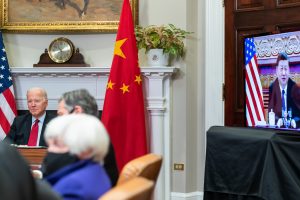Calling the recent increasing tension between the United States and China a new Cold War has been in vogue among pundits. Considering the fact that the United States and China fiercely struggle with each other both geopolitically and ideologically, the tension between the two powers certainly shares features with the original Cold War, which resulted in the U.S. victory against the Soviet Union about 30 years ago.
On September 21, 2021, however, U.S. President Joe Biden stated in a speech at the United Nations General Assembly, “We are not seeking a new Cold War.” The Biden administration’s Indo-Pacific Strategy, released in February, can be seen as confirmation of the president’s statement. It says, “Our objective is not to change the PRC [People’s Republic of China] but to shape the strategic environment in which it operates, building a balance of influence in the world that is maximally favorable to the United States, our allies and partners, and the interests and values we share.”
In an article published in Foreign Affairs in 2019, Kurt Campbell and Jake Sullivan argued that “[t]he Cold War truly was an existential struggle. The U.S. strategy of containment was built on the prediction that the Soviet Union would one day crumble under its own weight.”
“No such prediction holds today,” they continued. “Despite China’s many demographic, economic, and environmental challenges, the Chinese Communist Party has displayed a remarkable ability to adapt to circumstances, often brutally so.” Although Campbell and Sullivan acknowledged that “China may well encounter serious internal problems,” they cautioned that “an expectation of collapse cannot form the basis of a prudent strategy.”
“Even if the state does collapse,” they added, “it is likely to be the result of internal dynamics rather than U.S. pressure.”
Although Campbell and Sullivan were not in government service in 2019, they now both occupy important foreign policy positions in the White House: Campbell is a deputy assistant to the president and coordinator for Indo-Pacific Affairs (often informally dubbed the “Indo-Pacific czar”) while Sullivan is Biden’s national security adviser. It is reasonable to assume that the administration’s new Indo-Pacific Strategy reflects their standpoints expressed in this Foreign Affairs article.
The objective of the new strategy could be negatively called “dovish,” on one hand. On the other hand, it could be positively viewed as realistic if history – in which the United States has never successfully changed China as it wanted – is taken seriously. Campbell correctly highlighted that dimension of the Sino-American history in a Foreign Affairs article co-authored with Ely Ratner in 2018, saying, “The United States has always had an outsize sense of its ability to determine China’s course. Again and again, its ambitions have come up short.”
While the new Indo-Pacific Strategy denies pursuing regime change in China, it admits that the United States is “competing with the PRC to defend the interests and vision for the future that we share with others.” “Competition” is a word that has defined the relationship between the United States and China since the Trump administration officially abandoned the so-called engagement policy toward China. The literal meaning of the word is “a situation in which people or organizations try to be more successful than other people or organizations.” It should be noted that competition does not necessarily mean an adversarial relationship between competitors. There is competition even between friends, as seen in school sports events for example. The National Security Strategy released by the Trump administration in 2017 also stated that “[c]ompetition does not always mean hostility, nor does it inevitably lead to conflict.”
Unlike the Soviet Union during the Cold War, China is a competitor, rather than an enemy. Therefore, it is possible for the United States to pursue the establishment of a cooperative relationship with China. The new Indo-Pacific Strategy stipulates that the U.S. “will cooperate with our allies and partners while seeking to work with the PRC in areas like climate change and nonproliferation.”
As historian Hal Brands showed in his book recently published by the Yale University Press, the Cold War provides the United States with valuable lessons about how to manage the competition with China. In this sense, the Cold War analogy is useful. However, the fact that the Biden administration views the current tense relationship with China differently from the Cold War is also important. According to Campbell and Sullivan’s Foreign Affairs article in 2019, that recognition comes from the concern that “[t]he Cold War analogy at once exaggerates the existential threat posed by China and discounts the strengths Beijing brings to long-term competition with the United States.”
The Russian invasion against Ukraine must make the Biden administration more sensitive to the limit and potential of U.S. national power. That sensitivity will strengthen its policy of not seeking a new Cold War with China, which is reflected in the new Indo-Pacific Strategy.

































